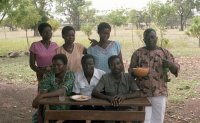A Teaching Moment: The Peace Corps as a Source of Inspiration
Your content has been saved!
Go to My Saved Content.Do you know how the Peace Corps got started? And do you know why it's important to know how? Since this month is the 52nd anniversary of the Peace Corps, let's take a moment to find the answers.
It started with students greeting President Kennedy at the University of Michigan for a 2 a.m. campaign rally. Spontaneously, he asked those in the raucous crowd of 10,000 who were planning to be doctors, "How many of you would be willing to spend your days in [the developing world] working for the U.S. and working for freedom?" Their enthusiastic response led him to repeat this question to prospective technicians, teachers, and engineers. Each group was more enthusiastic than the next.
But the idea did not drop, as many campaign actions do. Eight hundred Michigan students signed petitions stating their intention to go overseas and these were presented to the Kennedy campaign. JFK proposed the idea of a Peace Corps at a speech in San Francisco just prior to the election, and the day after inauguration, he appointed Sargent Shriver to create this entity -- for which many people volunteered after hearing the speech, but prior to its actual creation.
Lesson #1: Students at all levels, preschool through high school and college, respond to inspiration and a sense of higher purpose.
Lesson #2: All the goodwill in the world would have come to naught if Sargent Shriver had not set up an infrastructure to create a pathway from inspiration to action and if this structure did not live according to the ideals it espoused.
Corollary for schools: Our students need inspiration and then outlets to make a tangible difference. They will be wiling to work for an opportunity like this. Service is a primary way, but not only way, to make a difference in the lives of others. Sometimes it is just being able to share one's skills and gifts. But that must be organized and recognized.
What are the Essential Principles of the Peace Corps that can be part of the climate of schools?
There are no better words to express this than those of Sargent Shriver himself. Speaking at the 25th anniversary of the Peace Corps celebrationat a national conference of returned Peace Corps volunteers and staff in Washington DC on September 20, 1986, Shriver said:
"And we all think that everyone in the Peace Corps, and everyone who has ever worked in the Peace Corps, is a special person, who given a chance will overcome any problem! In believing this about each other, in believing this about all Peace Corps people, we are giving reality to the words of Martin Luther King, Jr."
Lesson for schools: Treat everyone in the school as special and everyone will be lifted up. Together, much can be done that cannot be accomplished by individuals alone.
"Peace cannot be maintained in the less-developed world, nor Communism stopped there or anywhere else by self- centered preoccupation with our own problems and safety, or by reliance primarily on force of arms. We cannot police the world. But we can begin to liberate it from despair and fear and anger by making economic development and mutual service the hard core of our foreign policy, and of our national defense!"
Lesson for schools: Small steps, even amidst great despair, are the key to long-term and sustained success. Do not worry about aggrandizing yourself, and do not try to coerce. As we "liberate" students "from despair and fear and anger," we will find their willingness to work, learn, and achieve will blossom.
"I mean we are celebrating a happening, a movement, a reality which cannot be fully explained scientifically, mathematically, sociologically, or politically. A miracle transcends logic. Quantitative amassing of facts does not reveal its nature. Miracles, by definition, are inexplicable by normal human reasoning. They transcend ordinary reality. They surprise. They shock. They un-settle."
Lesson for schools: This is how climate changes. The school itself becomes the subject of a movement of liberation, improvement, meaning and purpose. It is more than scores; it is transcendent. Anyone who has seen a school turn around, truly turn around, with heads held high and pride replacing dejection knows exactly what Shriver is talking about.
"To believe in men and women, to believe they can surpass themselves, to believe that ordinary people can become extra-ordinary, to believe in young men and women, and know they can accomplish miracles -- these were part of Kennedy's character and vision."
Paraphrase for schools: To believe in teachers and other staff and students, to believe they can surpass themselves, to believe that ordinary can be turned into extra-ordinary, to believe in our students and to know that they can accomplish miracles -- these are the essence of our vision for what all schools can become.
The anniversary of the Peace Corps is a time for inspiration. It is a time to realize that our potential is far greater than we typically believe and that we are help back less by our abilities than our circumstances and lack of structures enabling us to collaboration, cooperation, serve, learn and soar. When Sargent Shriver was asked to create the Peace Corps, his first reaction was that he knew nothing about it and could not fathom how to create it.
But as he reflected again, he realized that the liberation of the human spirit, the channeling of hope into action, and learning skills to allow tangible contributions to the lives of others were things he did know about. And from those, the Peace Corps emerged and continues. And the same can happen in our most challenged schools.
How might you use the story of the inception of the Peace Corps with students? What lessons are you already using to inspire caring for others and service in your students? Please share with us in the comment section below.
